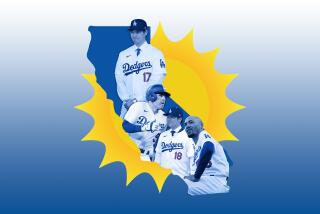‘Littlest Angel’ now has huge impact on boys’ lives
As one of the shortest players in the history of Major League Baseball, Albie Pearson says he was never booed.
Not even on the road.
“I was the guy-who-never-made-it’s hero,” says Pearson, who stood 5 feet 5 and weighed 140 pounds. “The blue-collar guy who made a couple hundred bucks a week would always root for me.”
Imagine, then, how fans might honor him today because Pearson, 74, is still leaving an outsized mark, still making a contribution worthy of admiration and applause.
“The Littlest Angel,” as the former outfielder was known when he played for Gene Autry’s expansion Angels from 1961 to 1966, is the founder of Father’s Heart Ranch in Desert Hot Springs, an 11-acre home for abused, neglected and abandoned boys.
These are kids, ages 6 to 12, whose lives have been torn apart so horribly, Pearson says, that it’s almost unimaginable.
Pearson, an ordained minister, offers comfort and hope.
“We saw a tremendous need with these little guys,” he says during an interview at the ranch, voice cracking and eyes welling. “We teach them that they’re not a piece of meat, that they were created and there’s a plan for every one of them.”
Looking up, he smiles.
“They respond to love,” he says.
Pearson and his wife, Helen, married 55 years and high school sweethearts before that, have five grown daughters of their own, 17 grandchildren and 12 great-grandchildren.
But that didn’t stop them from emptying their wallets 12 years ago, selling their home on a golf course and plunking down $200,000 to buy a dusty parcel in “no man’s land,” as Pearson describes the out-of-the-way site where dorms and a dining hall were later built.
For 16 months, with nowhere else to go, the couple lived there -- until a daughter and son-in-law bought them a place to live at PGA West, the same course where they’d lived previously.
“There was no other way to buy it,” Pearson says of the ranch site. “It’s hard to explain -- I call it a God thing -- but we had this desire to put our hand to something for the kids. . . .
“We came over here . . . and when we walked on to the property, I said to my wife, ‘This is what God wanted.’ ”
Spiritual from a young age, Pearson credits divine intervention for shaping key developments in his life.
Though born with spina bifida, a sometimes debilitating back condition, and weighing less than 100 pounds in the ninth grade, he was a multisport star at El Monte High, lettering in football, basketball, baseball, tennis and track and field.
Before signing with the Boston Red Sox in 1953, he asked for a bonus and was told by a scout, “If I gave you a bonus, they’d fire me.” Instead, he was given a suitcase and two pair of shoes.
In the majors, Pearson batted .270 in nine seasons with the Washington Senators, Baltimore Orioles and Angels before a back injury forced him to retire in 1966, the first year the Angels played in Anaheim after moving from Dodger Stadium.
The American League rookie of the year with the Senators in 1958, the diminutive left-hander scored the first run in Angels history in 1961, led the American League in runs in 1962 and made the American League All-Star team in 1963.
His size, Pearson says, was never a hindrance, “except in the eyes of those I was trying to please.”
In retirement, Pearson is an avid golfer and five-time super-seniors club champion at PGA West.
But mostly he has devoted his life to God -- and to kids.
He started a Riverside youth foundation in the late 1960s, trying to help kids stay off drugs, and later founded a nonprofit that, in essence, provides training for pastors and missionaries.
Pearson has started dozens of churches worldwide. His foundation, meanwhile, has opened several orphanages.
Father’s Heart Ranch, which opened in 2002 and is presently housing 24 boys, is his crowning achievement.
“When you see a little kid whose life is changed,” Pearson says, “it’s worth more than any home run I ever hit.”
When the boys arrive, Pearson says, “they don’t trust anybody. They’re full of anger and hurt and hate. I can’t tell you the nightmares that happen when a kid is violated.”
Chester Ainsworth, a retired San Bernardino County social worker, says Father’s Heart Ranch excels “because they’re so good at working with the kids.” Noting that he had placed several boys there, Ainsworth says, “I chose the ranch any time I thought a child would respond to a truly caring situation.”
Pearson, he adds, “definitely has a vision.”
While the day-to-day operation is handled by a staff of about 30, Pearson and his wife are actively involved. They’d like to add a school on site, as well as a swimming pool and baseball diamond. This summer, they’ll open a new wing for boys 13 to 18.
“He’s really taken a passion of his and made it something beneficial for so many kids,” says Matt Bennett, community relations manager for the Angels, whose donation last year helped buy caps, jerseys, shoes and baseball gloves for the boys. “I think he’s really going to change a lot of these kids’ lives.”
That’s the plan, of course.
“This may sound pretty corny,” Pearson says, chuckling to himself, “but I’m still playing with the Angels.”
At Father’s Heart Ranch, he’s the captain.
--
More to Read
Go beyond the scoreboard
Get the latest on L.A.'s teams in the daily Sports Report newsletter.
You may occasionally receive promotional content from the Los Angeles Times.






